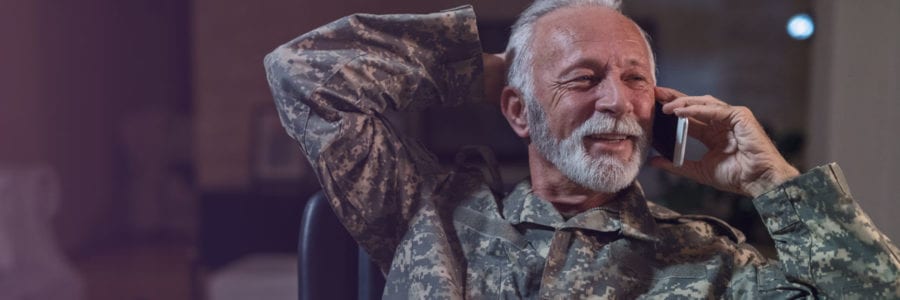Smell may be the sense tied closest to memory, but the sound of a loved one’s voice can’t be too far behind it. For those that work in high pressure and/or dangerous jobs, hearing the right thing at the right time can make all the difference in the world. The Voice Library provides a way for military, first responders, and their families to tap into positive memories through the power of the human voice.
Combating the Combat Deployment Blues
The spouse of a military serviceman came into Al Brandano’s (founder and CEO of The Voice Library) office with an idea. She was already a fan of The Voice Library platform and with her husband preparing to deploy for active duty she believed it would be a great way for soldiers and their families to stay connected during a deployment.
In order to make it easy on military families, Brandano helped her to figure out a sponsorship model whereby businesses and individuals could sponsor a subscription for the Voice Library platform for military families. Initially, she raised funds to procure 200 subscriptions for active duty soldiers. From those humble beginnings the program has grown rapidly.
Since the program’s inception, The Voice Library has been able to provide over 1,800 subscriptions through corporate sponsorship. In 2018, the program expanded to include first responders and their families, too.
How It Works
The platform provides subscribers with two types of access, recorder and listener. Account members can create and access voice recording using their phone. Once a recording exists in the account it gets a unique PIN and passcode.
The creator of the recording can then share this access information with anyone they want. Individuals can call the TVL platform at any time to listen to the recordings in their account. So, the mother deployed in Afghanistan can make recordings that her kids at home can hear, and vice versa.
TVL built the voice applications that allow users to record and access their recording libraries over the phone using the Plum DEV platform.
Fighting Isolation
Not only does the Family Story Project help keep families and friends connected, but those serving on the front lines often derive additional benefits from the service. Brandano notes that it’s become useful for fighting the isolation that many servicemen and women feel at home and abroad.
“When someone’s isolated–all alone-they do things that maybe aren’t good for them like harm themselves. This service has helped some folks suffering from PTSD. We’ve helped families cope with isolation and loneliness because a child can hear their father’s story in his voice, or a mom on the front lines can hear her daughter read Goodnight Moon. It’s pretty powerful stuff.”
The Pentagon Gets Involved
Word about the program eventually made it to the Pentagon and soon Colonel Philbrook, who worked on the Suicide Prevention Task Force, contacted Brandano about using the Voice Library program in conjunction with their own efforts.
This led TVL to get involved with a project called Story Bunker where families can capture stories and recordings before their loved one deploys so that they can establish a library of recordings. Not only does this help to familiarize everyone involved with the platform, but it also creates a ready-made library of recordings so that they’re available from day one.
Expanding the Impact of Voice
The crucible of the frontlines forges very special and unique bonds between people. That’s the underlying factor behind another program called Battle Buddies. This builds on the camaraderie that naturally occurs during military service by encouraging soldiers in the same unit or serving on the same ship, for example, to preserve their stories and experiences together.
Post-deployment, these recordings can be cathartic or combat negative impulses for some soldiers. For others, they can simply provide a reminder of good times and good friends, as told by those people.
Being able to actually talk through a traumatic experience is a critical first step of the healing process and TVL helps facilitate that. “The ability to not be judged and to tell your story is part of the healing process,” says Brandano. The various TVL programs give individuals the ability to vocalize their experiences privately, to themselves, often for the first time.
Too often, in our hyper-connected world people don’t really connect. The human voice helps to bridge the gap between being connected and connecting. The Military and First Responders Family Story Project continues to make a positive impact on those who put duty and country ahead of everything else.
To learn more about the Military and First Responders Family Story Project, visit https://www.thevoicelibrary.net/MilitaryFirst/.

